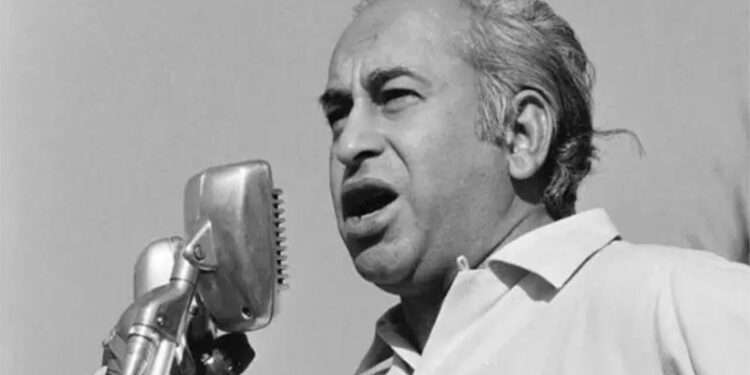Nation Pays Tribute to a Visionary Leader and Founder of the Pakistan People’s Party
Pakistan is solemnly observing the 46th death anniversary of former Prime Minister Zulfikar Ali Bhutto today, April 4, 2025. Widely regarded as one of the most influential and charismatic political figures in the country’s history, Bhutto left a lasting imprint on Pakistan’s political, social, and constitutional landscape.
The Life and Legacy of Zulfikar Ali Bhutto
Zulfikar Ali Bhutto was born on January 5, 1928, in Larkana, in what was then British India and is now part of Pakistan’s Sindh province. Coming from a wealthy landowning family, Bhutto was educated at some of the world’s top institutions, including the University of California, Berkeley, and Oxford University.
His political journey began in earnest when he was appointed Minister of Fuel, Power, and Natural Resources in 1958. Bhutto later served as Foreign Minister under President Ayub Khan. His growing popularity and ideological divergence with the military-led regime eventually led to the founding of the Pakistan People’s Party (PPP) in 1967, based on the slogan: “Roti, Kapra aur Makaan” (Bread, Clothing, and Shelter).
Bhutto went on to become President of Pakistan (1971–1973) and then the Prime Minister (1973–1977) after the adoption of the 1973 Constitution, which remains the legal backbone of Pakistan to this day.
A Controversial End to a Remarkable Career
Bhutto’s political tenure was marked by sweeping reforms, including the nationalization of major industries, land reforms, and the initiation of Pakistan’s nuclear program. However, his time in office was also marred by allegations of authoritarianism and electoral manipulation.
In 1977, Bhutto was ousted in a military coup led by General Zia-ul-Haq, and was subsequently tried and convicted for conspiracy to commit murder. Despite international criticism and appeals for clemency, Bhutto was hanged on April 4, 1979, in Rawalpindi Central Jail, under a highly controversial and politically charged trial.
Supreme Court Acknowledged Trial Was Unfair
In a landmark decision issued in 2024, nearly 45 years after his execution, the Supreme Court of Pakistan acknowledged that the trial of Zulfikar Ali Bhutto was not fair. The admission, while not legally reversing the conviction, added significant weight to the argument that Bhutto was a victim of judicial injustice and political victimization. Legal experts and human rights advocates hailed the Supreme Court’s decision as a step toward historical reconciliation.
Public Holiday Declared in Sindh Province
To honor the memory of the late leader, the Sindh government declared April 4, 2025, a public holiday throughout the province. All government offices, educational institutions, and local bodies remained closed, allowing people to participate in commemorative events and reflect on Bhutto’s contributions to the nation.
Ceremonies Held at Garhi Khuda Bakhsh
The main event marking Bhutto’s death anniversary was held at his mausoleum in Garhi Khuda Bakhsh, located in Larkana district. The mausoleum also serves as the final resting place for Benazir Bhutto, Zulfikar’s daughter and two-time Prime Minister of Pakistan, who was assassinated in 2007.
Thousands of PPP workers and supporters gathered from across the country to pay their respects. Senior PPP leaders, including Bilawal Bhutto Zardari and Asif Ali Zardari, addressed the crowd, remembering Bhutto’s struggle for democracy and justice.
Bilawal Bhutto, the current chairman of PPP and grandson of Zulfikar Ali Bhutto, reiterated his commitment to his grandfather’s vision for a progressive, inclusive, and democratic Pakistan. He emphasized the need to continue the struggle for social justice, equality, and economic reforms.
Tributes from Political and Civil Leadership
The 46th death anniversary of Zulfikar Ali Bhutto prompted tributes from all corners of the political spectrum. President Asif Ali Zardari described Bhutto as a “symbol of resistance and a voice for the oppressed.” He further stated that Bhutto’s sacrifice laid the foundation for democratic values in Pakistan.
Various political figures, journalists, and civil society members also took to social media to express their admiration for Bhutto’s contributions. Hashtags such as #ZAB46, #ZulfikarAliBhutto, and #DemocracyMartyr trended on Pakistani Twitter throughout the day.
Bhutto’s Enduring Influence
Despite the passage of nearly five decades, Bhutto’s influence on Pakistan’s politics remains profound. His legacy continues through the PPP, which remains a major political force in Pakistan, particularly in Sindh. His ideology and speeches are still quoted in political discourse, especially in debates on democracy, civil rights, and economic equality.
Bhutto’s vision of an empowered and self-reliant Pakistan, free from external domination and committed to the welfare of its people, still resonates with millions.
Conclusion
As Pakistan commemorates the 46th death anniversary of Zulfikar Ali Bhutto, the day serves as both a tribute to a leader who reshaped the country’s political identity and a reminder of the perils of political intolerance and judicial overreach.
While opinions on his leadership remain divided, there is widespread agreement that Zulfikar Ali Bhutto was a pivotal figure in the development of modern Pakistan. His contributions to constitutional development, foreign policy, and democratic reform continue to shape the national narrative.
The annual observance of his death anniversary not only honors his memory but also reinforces the ongoing struggle for justice, democracy, and people-centered governance in Pakistan.

























